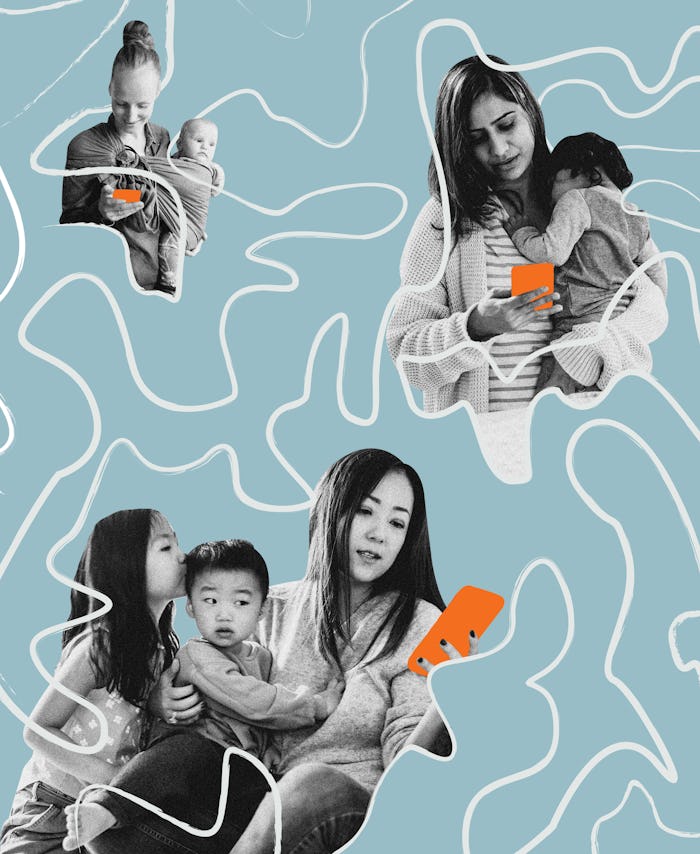Life

Let Us Now Praise Disembodied Mom Friends
The pandemic-era mom thread reminds me of nothing so much as the dark intimacy of tween friendship over 90s-era instant messenger.
There is so much beauty in the experience of shared mothering — getting to know someone else’s kids, scooping them up with one arm, unwrapping popsicles and handing them around, watching them at the playground, coordinating a pickup, taking them to the zoo, feeding them snacks. It is a gift to find moms with whom you can forge this kind of collaborative relationship, moms with whom you may never have much else in common. But this year, for me, was not about these moms. The pandemic, for many of us, meant saying goodbye to this kind of mothering, or whittling it down to some intense and insular pod iteration.
Thus the phone became the site of my community to a greater extent than ever before — a place to joke about murdering pets and partners, or to workshop things we would never actually say to that one neighbor who let their kids play with all the other kids knowing they had been exposed to Covid. The moms on the phone were brains in a jar, emojis on the text, the village that became a SIM village, sharing the kind of brutal gallows humor you would never share out loud.
Making mom friends under normal circumstances is a balancing act between opening your heart to the simply batshit life experience of becoming a parent, an experience as vivid as falling in love, as vivid as grief, but with a whole host of logistical and financial complications that become inextricably part of the whole enterprise. Part of the experience of making IRL friends based solely on reproductive or family status is then observing one another’s parenting style as it develops in real time. Your most reliable subjects of conversation are the new creatures who have come to live with you and invariably you must watch one another learn how to care for them in an environment where you are both vulnerable, receiving feedback both implicit and explicit from every which way. There is a special love you can forge with the text parents who you don’t actually have to see parenting, or wonder if they are watching you and noting, “Wow, I would not do that”— secretly a little horrified by something you or your child says, does, eats, watches.
I love the fundamentally unreliable narrators we all are, how our spouses or parents or bosses will never be called upon for their side of the story.
I like hearing about my newly-disembodied mom friends’ kids, imagining them out in the world, but I love the veil of mystery that the text medium affords us all. I love the fundamentally unreliable narrators we all are, how our spouses or parents or bosses will never be called upon for their side of the story, and how that is fine. Even better, there’s no imminent need to stand together awkwardly barbequing, witnessing one another interact with our famously challenging beloved baby nightmares in the wild. To me, this is beautiful. I can describe the ways that my kids drive me crazy but my kids, and I, are protected from being perceived doing all the horrible shit I report to the moms on the phone.
The pandemic-era mom thread reminds me of nothing so much as the dark intimacy of tween friendship over 90s-era instant messenger — intimacies that would have shriveled like salted slugs were they to happen in person, the conversations that were possible only because they happened in the ether, no face attached, no expression to read, pure narrative, pure feeling. There’s such a deep, nourishing relief in a friendship that is very much rooted in motherhood, of which motherhood is an inescapable part, but where the inconveniences of the world itself never interfere. It’s all support, all love, all hate (for the other mom’s enemies, who you will never meet).
I want the pandemic to end, but I never want to say goodbye to these threads. One of the refrains in one of my mom texts is about the vacation we will one day take together. We live in different states. On the one hand, I love these women and miss being able to see them and love to indulge our shared textual fantasy of having drinks poolside. But if I can keep the intimacy of the disembodied text, I’d happily never seen them again. That’s how you know this love is real.
Lydia Kiesling is the author of The Golden State, a 2018 National Book Foundation “5 under 35” honoree, and a finalist for the VCU Cabell First Novelist Award. Read more of her work at www.lydiakiesling.com.
This article was originally published on